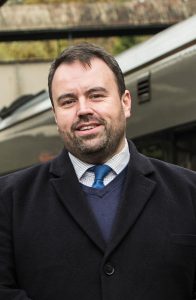
October 2021
Elected in December 2019 after three years of Brexit wrangling, West Dorset MP Chris Loder knew there were challenges ahead. What he didn’t know, however, was that just around the corner lay a global pandemic that would reset everyone’s priorities. We had a few questions for Chris while he was in Bridport recently.
The Bridge: Chris, you come from a farming family and had a career with South West Trains (later South Western Railway), where you rose to a senior position. Why did you decide to enter politics?
Chris Loder: Four or five years ago, if you’d asked me about a change of career, I’d have said no, I’m quite happy with the railways. But the situation we started to see with Brexit was deeply troubling for me, because I started to see parliament push back against the democratic will of the country. I try not to be partisan about Brexit, although that’s difficult, but I felt we needed to make sure that will was respected and by 2018 I was becoming increasingly concerned about it.
I’d been a district councillor for a while [2013–15] for my home villages south of Sherborne and I got an insight into politics and how we can take it for granted, talking ill of politicians of any party while not really understanding the work they do. When Oliver [Letwin] said he was going to retire, I thought I’d like to put my hat in the ring.
I was elected in the middle of what must have been the most divisive and fractious issue the country has dealt with since the war, and in West Dorset you couldn’t get much more divided than 51% for Leave and 49% for Remain. What resonated the most for me was that, regardless of how people voted, the vast majority wanted to see the democratic will delivered, and to see an end to the bitterness, the really unpleasant discourse that had happened as a result.
TB: Bridport is one of a few towns in a fairly rural constituency. It’s also less traditionally Conservative than other parts of West Dorset, with no Tory representative on Dorset Council and only one Conservative out of 18 seats
on the town council. How will you engage with the people of this politically diverse town?
CL: There are different priorities for different places, and it’s true that Bridport is a political rainbow. I don’t like to think of myself as a hugely politically divisive politician – that’s not West Dorset. I talk to the mayor and the clerk every two months about where Bridport needs my help, and the fact that the leader of the town council is a Liberal Democrat makes no difference whatsoever. We clearly have different political thoughts, but particularly during coronavirus the town council has had my support every step of the way, and vice versa. There are many more things we have in common than a lot of people think.
In some situations people will think I’m not aligned with them because I have a different perspective. For example, the topic of meat consumption and its impact on the environment. There’s a strong view from a number of people that farming in this country is high production, not dissimilar to the US-style of farming, with thousands of cattle, like a meat factory. Nothing could be further from the truth. The reality is [farms like] my mum and dad’s, with 140 acres. They don’t own the farm, they have about 100 cattle and my dad knows every single animal by name – and I was calving with them the night before the general election. There’s a big difference between what people think farming is and the reality here in West Dorset.
One of the biggest learning curves I’ve had as an MP is that very often we can take things at face value, and we need to learn not to do that, to ask the question: is that really that case?
TB: What issues are the people of Bridport facing?
CL: During coronavirus it’s been about getting help to people in need, how our hospital has managed and what we as a community can do to help people. Elsewhere, there are environmental issues such as the considerable litter problem down in West Bay. The situation with plastic and rubbish is something we could not be more closely aligned on. I’ve spoken many times in the House of Commons about the issue of single-use plastic and how I think the supermarkets have abused plastics to substantiate their dominant market position. They have no responsibility for its disposal and I’m pleased the government is finally taking some action in terms of deposit and recycling schemes and so on, even though in my opinion this doesn’t go far enough.
In terms of food production we’re in a strong place here in West Dorset to be more self-sufficient by buying local. This is the single biggest thing we can do to help the environment and we should all try and do it. I don’t want to break the supermarkets, but I do want to break their stranglehold and control, which is making life very hard for our small farmers and at the same time making money from consumers at all levels.
We hope to catch up with Chris again in the new year.